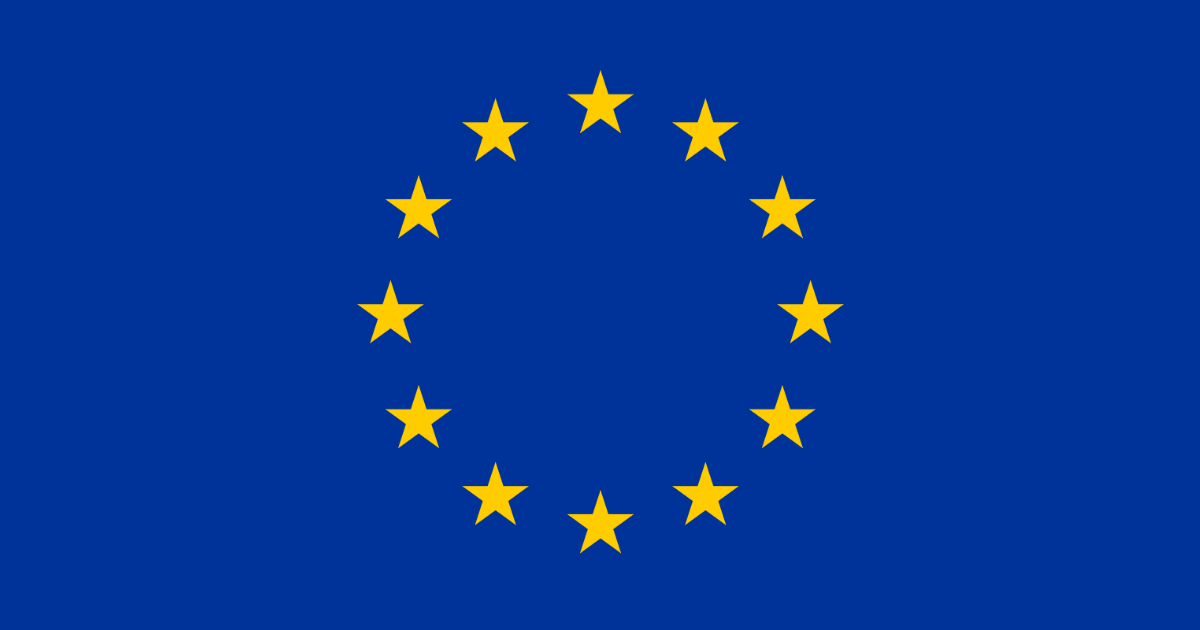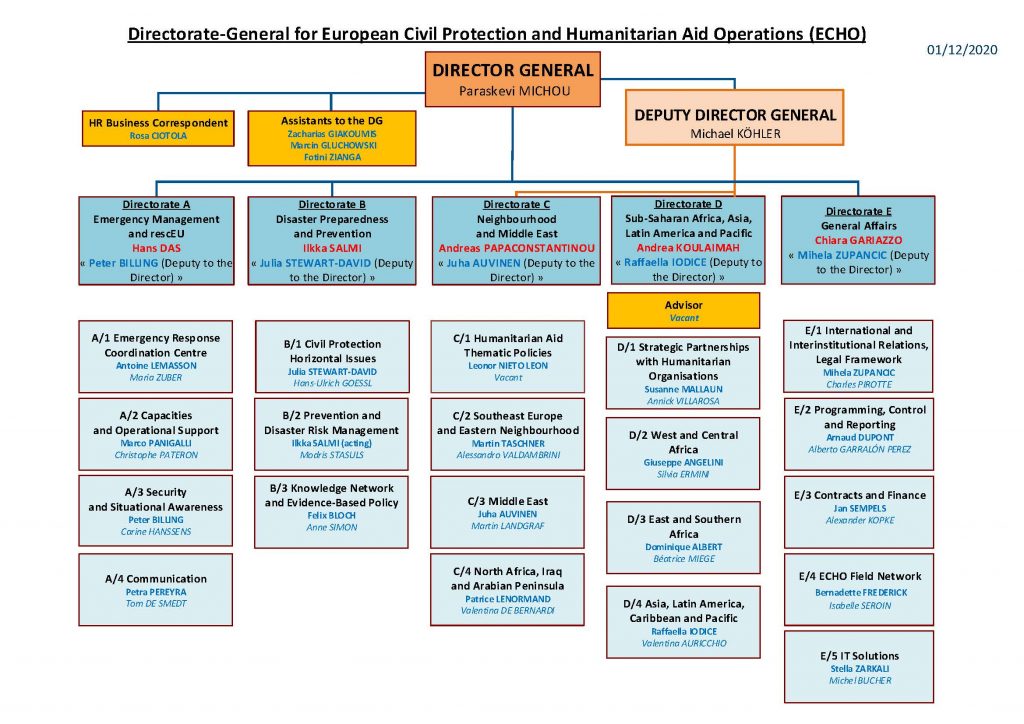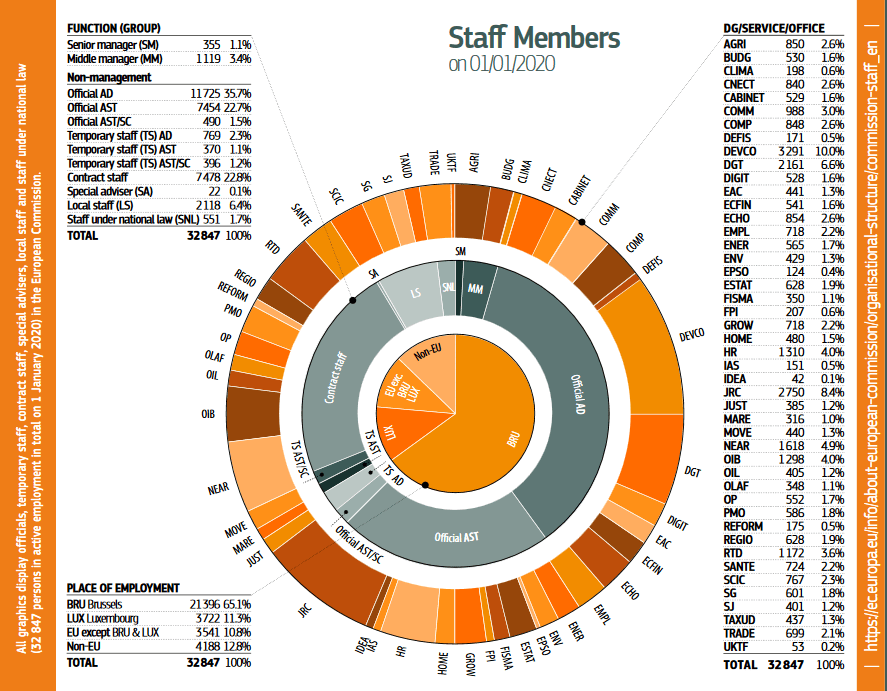Where to work and how to get a job in the European Union? The overview
On this article we will see the overall job opportunities and contracts that are available if you want to join and work for the European Union. We will also introduce the complex recruiting process that you may encounter and highlight the different opportunities for young graduates.
First and foremost, if you want to understand this article, you should get a clear understanding of the functioning of the EU. Hopefully, the first part of this series, called “What is the European Union? (Infographic)” should answer all your questions. Our third article, on the other side, will focus on the job opportunities that are available for designers.
Table of Contents
The EU system
1. Introduction
We often imagine the European Union as a place filled with politicians. In reality, the EU is more of an administration full of EU civil servants coming from all over Europe. Below is an example of the Directorate-General ECHO from the EU Commission.
2. Statistics
The EU System, as a whole, employs over 60,000 people from the 27 EU member countries.
- The European Commission employs 32,847 people (2020).
- The European Parliament employs around 7,500 people in the General Secretariat. Plus the MEPs and their staff.
- The Council of the European Union employs around 3,500 people in the General Secretariat.
- EU agencies and Executive agencies employ 8,957 staff members (2018).
These numbers may seem high, but it is not a lot when we know that the European Union counts 446 million inhabitants.
To give another perspective, 60,000 employees is a bit less than the number of civil servants in the central public administration of Sweden.
3. Grades, category and sub-category of employees
A EU civil servant is a generic term applied to all staff serving the institutions and agencies of the European Union. You do not have to be a civil servant to work in the EU. The main difference is that EU staff are subject to EU’s Staff Regulations, i.e. employees are not subject to national tax laws, but pay a Community tax which is directly paid back into the EU’s budget.
Let’s first introduce the different kind of contracts available and then, we will explain the recruiting process.
3.1 EU Civil Servant
If you want to become a EU civil servant, there are three different kind of contracts: a permanent contract, a temporary contract and a fixed-term contract.
Permanent contracts have three categories:
- Administrators (AD) are involved in drafting policies, implementing EU law, analysis or advisory work. The policy sectors include administration, law, finance, economics, communications and science. Administrators represent 35.7% of total staff.
- Assistants (AST) will typically be engaged in an executive or technical role in administration, finance, communication, research, or policy development and implementation. They represent 22.7% of total staff.
- Secretaries/clerks (AST/SC) are related to office management.
Temporary contract are usually available in highly specialised fields such as scientific research. They represent only 2% of total staff.
Fixed-term contract are recruited to manual or administrative support-service tasks or to provide additional capacity in specialised fields where insufficient officials with the required skills are available. If one is successful in obtaining a contract, one will be employed for a fixed minimum period, often with a shorter initial contract of 6-12 months depending on the type of job. In some EU bodies, the contract could be extended for an indefinite duration. Contract staffs represent 22.8% of total staff.
3.2 Non-EU Civil Servant
There are other interesting types of contracts that are offered by the EU institutions or by third parties but they are not permanent and do not offer the same EU benefits.
Recruitment: where to apply?
1 The EU institutions: EPSO
EPSO, the European Personnel Selection Office, is an interinstitutional office responsible for selecting staff to work for all the institutions of the European Union. As its name suggests, EPSO only selects candidates through “open competitions”. The candidates succeeding in the exams are called “laureates” and are placed on “Reserve lists” (commonly called talent pools). Then, each institution can recruit staff from the lists.
Succeeding to get such a contract and you will become an official EU civil servant.
EPSO processes on average 50,000 applications a year for approximately 1,500 places.
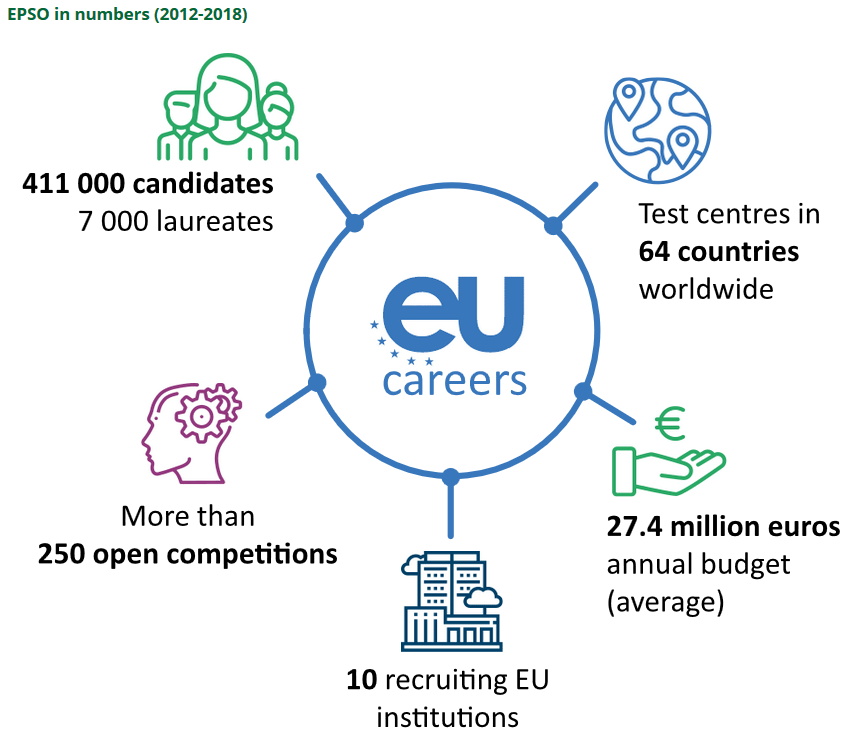
1.1 Open competitions: the procedures
Edit 18.02.23: keep in mind that this article is from 2021. EPSO is in the process of changing their procedures so keep an eye on their website.
The procedure is called “open competition” and is similar to a talent pool preceded by a series of exams. On the Job opportunities page of EPSO, you will be presented with several categories. The ones concerned by open competitions are permanent contracts and fixed-term contracts (CAST). Within the open competitions for permanent staffs, there are two (non-official) categories which will entail different selecting procedures:
- Generalists will focus on a professional category rather than a specific job. Therefore, much more people have the skills to apply, creating very difficult competitions. You will need to prepare the tests to be among the top scoring candidates and have a chance to become a Laureate.
- Specialists are profiles that will require a specific knowledge about your profession to be a laureate. Therefore less people are applying and the test is easier (talent screener created by the recruiter). EPSO tends to have more and more specialists open competitions because the process it’s easier.
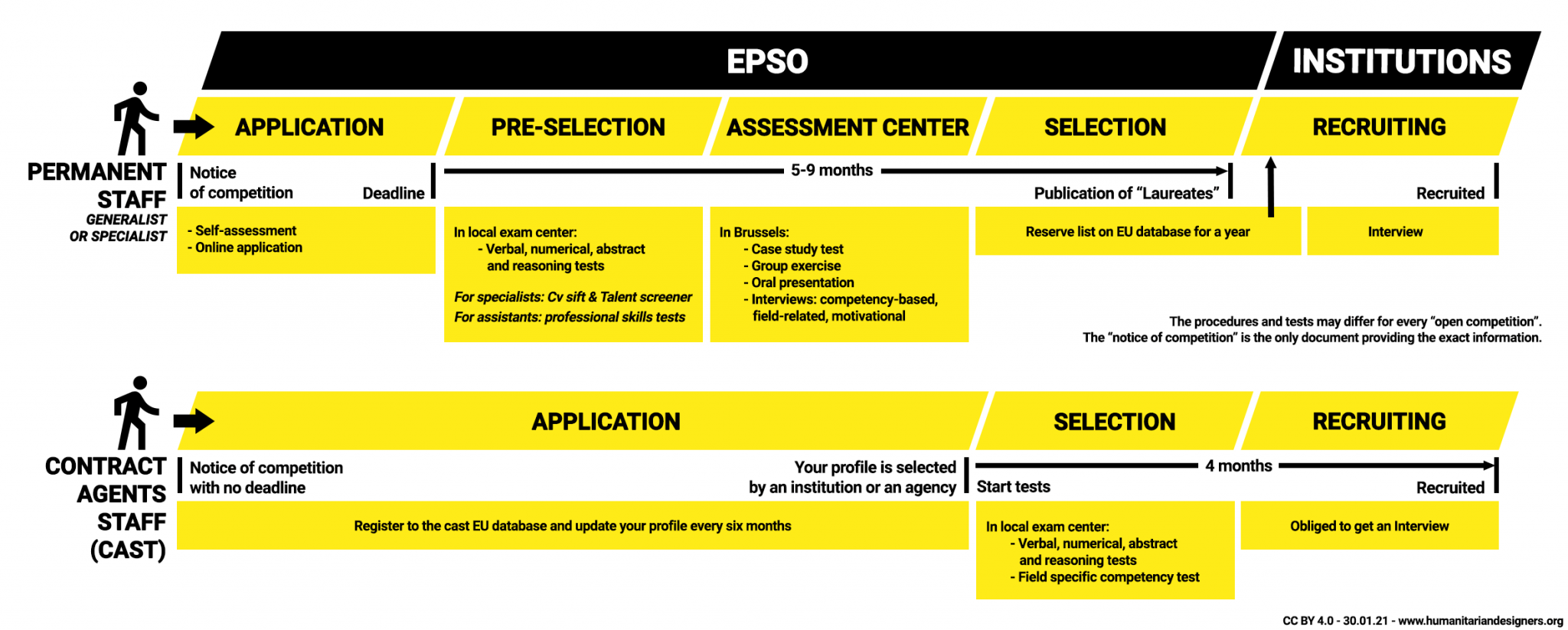
If it’s not very clear, the complete procedure of each competition is always thoroughly explained on the “notice of competition”. An explanation is available on the report: “The European Personnel Selection Office: Time to adapt the selection process to changing recruitment needs“. But we made a visual summary that should help you to better understand the process.
Tips and notes:
- A competition for permanent staff can be either for generalist or specialist profiles.
- Generalist competitions tend to follow a yearly cycle. AST happens during the Winter but the most famous competition is the entry-level “EPSO/AD Graduate Administrators – AD5” every Spring. On the contrary, specialists competitions may happen only once every few years.
- CAST competitions: you just need to apply to be on the Reserve list. It’s only if you get pre-selected by a recruiting service that you can pass the EPSO test organised once every month. You only need the minimum score to pass the test (see below). If you pass the tests once, the results are valid for 5 to 10 years. If you fail, you have to wait 6 months before a recruiting service can re-invite you to do the test at the same or higher grade. Recruiters are obliged to interview you. The recruiter’s goal is to recruit someone as fast as possible. Therefore, they may only contact candidates that already have a valid test result, to directly go to interviews.
- CAST professions range from group FG-I to FG-IV which equal to different levels of qualifications, i.e. FG-IV requires at least a Bachelor degree.
- Within the CAST competitions, “CAST permanent” are competitions with no deadlines. They allow a constant influx of candidates for categories that are often needed in the institutions, i.e. CAST Communication.
- We also advise you to check EPSO “upcoming opportunities” to better plan your applications. January, when the funds are delivered, might as well be a good period to check.
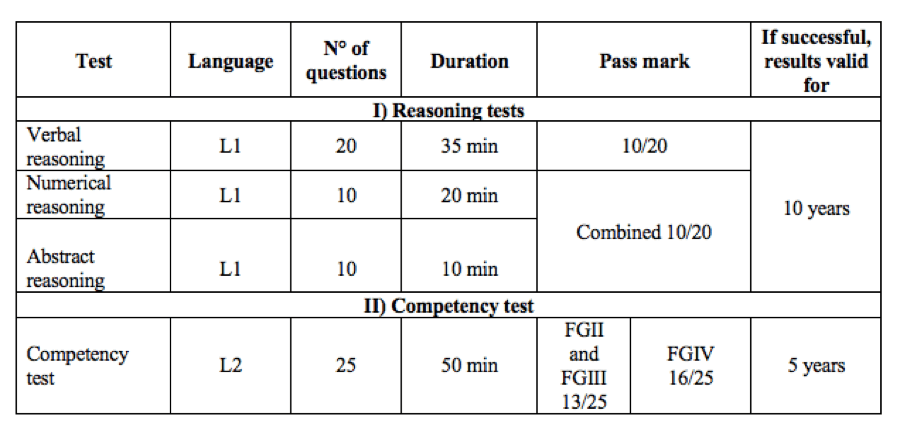
1.2 Open competitions: how to apply?
If you are considering to go through EPSO selection procedure, we strongly advise you to prepare yourself to their different exams, i.e. here, here or here at least a month in advance.
A bit like “logic exercises” during an IQ test, it requires training on specific set of exercises such as abstract reasoning or numerical reasoning.
A lot of training materials are available online, with of course free and paid services. Online webinars seem to be specific enough to get a good understanding, as long as they are not too outdated. Books could as well provide yearly updated editions.
2 EU agencies
While some EU agencies are using the EPSO selection procedure, most of them are using their own job board and selection methods. A minority might still use the EU CV Online. For job offers that are not managed by EPSO, the application procedure is like usual: a resume, a cover letter, and later on, an interview.
With more than 50 EU agencies, it’s hard to give an overall idea. Therefore, we have gathered all the job boards of all the agencies.
[*supsystic-tables id=4]
3 Traineeships
3.1 Selection requirements
In the EU, each institution and agency is responsible for selecting and recruiting their trainees. EPSO is not involved even though they have been really useful in gathering all the specific requirements from all the traineeship programs available, on their well documented traineeships page.
As a resume, the majority of the traineeship programs require you to
- be above 18 years old;
- be graduated from a Bachelor’s degree or equivalent;
- be a national from one of the EU member state;
- have followed your military service if mandatory by your country;
- have a proficient knowledge of two of the 24 EU official languages, one of which, at least, must be English, French or German;
- not have any previous working experience with the EU.
The majority of the traineeships last five months and are paid a bit more than 1000€ per month. The great advantage of traineeships is that each year they provide entry-level job opportunities in a wide range of activities.
As you can notice, there is no upper age limits to apply for a traineeship with the EU institutions. This choice is -probably- made to allow professionals from a corporate background to shift their career and serve the institutions. But it also means that experienced professionals can apply and get a traineeship, raising up the level of competition.
3.2 Selection procedure
Selection procedures for traineeships are run by the individual EU institutions and agencies. Therefore, it may change depending on the competitiveness of the traineeship program and the number of applications.
As you can see on EPSO webpage, there are 41 traineeship programs. But to give you an overall idea, based on the traineeships from the Institutions, the procedure goes as follow:
- Application: one month to apply; two sessions per year.
- Preselection and Eligibility check: tests and/or interviews may apply.
- Waiting list in case the top candidates decline the offer.
- Start of the traineeship: count around five months after the application deadline.
| Logo | Initials | Name of Institutions | HQ | Job Board | |
|---|---|---|---|---|---|
| EP | The European Parliament | Legislative | Strasbourg & Brussels | Schuman Traineeship | |
| – | The Council of the European Union | Legislative | Brussels | GSC Trainees | |
| EC | The European Commission | Executive | Brussels & Luxembourg | The Blue Book Traineeship |
3.3 EU commission: the Blue Book stagiaries
The official traineeship scheme of the European Commission has been running since 1960 and is the biggest traineeship programme in the world. They have two sessions per year (October and March) and recruit approximatively 600 trainees for about 10,000 applications.
It’s probably the most competitive of the three traineeships. Read the FAQ carefully because the process is a bit meticulous:
- Application: you must fill a single form and select three “ideal choices” of DGs and Units you would like to work in. You can write only three working experience and you have a limited amount of characters for your motivation letter. Each information bring points. You will have to prove all your educational and working experience during the eligibility check, after your application. Be ready with all your documents beforehand as you may have a limited amount of time to send them.
- Selection: If you are selected, you will appear on the (virtual) Blue Book database among 2,000 candidates. The different services from the Commission will then select the candidates from the database. They may or may not call you for an interview. They select about three people per job so if an applicant is selected for several traineeships, the second on the list takes over.
- Lobbying: as you can understand, with only 600 places, not all the people selected on the Blue Book are going to be recruited. Therefore, the main question for the Blue Book candidates is “to lobby or not lobby?”. Many people on forums reply by the affirmative and will directly contact the several Head of Units. The goal is to be seen by recruiters among this quantity of applicants, with the hope that this extra step will make the difference. It will need long hours to search for the organigrams of each units, and write the emails.
- If they accept you, you are an official Blue Book stagiaries. If not, you can re-apply from scratch at the next session.
3.4 EU Parliament: the Schuman traineeship
The official traineeship scheme of the European Parliament recruits about 700 trainees every year. A traineeship lasts five months. Like the Blue Book, there are two sessions. You may apply in June or November for traineeships starting in October or March.
The process seems to be less competitive than the Commission:
- Application: you have a list of trainee opportunities and you’re directly applying to them. Under each one of them is written how many people applied for this position. You can apply with your resume to three offers maximum and can send a different motivation letter to each one of them. The eligibility check requires your ID, University diploma(s), and a criminal record (don’t wait last minute to get those). And… that’s it.
- Selection: the recruitment unit may or may not call you for an interview and if it works well, you will receive an admission letter.
- If they accept you, you are an official Schuman trainee. If not, you can re-apply from scratch at the next session.
3.5 Council of the EU: the GSC traineeship
Every year, the General-Secretariat of the Council (GSC) offers around 100 places available for paid traineeships and about 20 places for unpaid compulsory traineeships.
Paid traineeships are for graduated candidates and unpaid traineeships are for students who have to complete a compulsory training period as part of their studies. There are two sessions per year. You may apply in February or August for traineeships starting in September or February.
4 Work with the EU
Working with the EU without having a permanent contract is like working for a large Institution without the benefits. Generally project-based contract, they also do not offer the same stability as you always need to re-negotiate your contract or prospect (lobby) to an other EU Unit that may need your skills.
But one of the big advantage is that you don’t need to go through the lengthy competitive exams from EPSO.
4.1 Interim consultant
The EU institutions conclude a number of framework contracts (FWCs), published as tendering procedures, with external contractors for specific services that are required on a regular basis. These are generally large, multi-annual contracts focusing on certain thematic areas where the EU doesn’t have the required staff. For example, several FWCs are made with communication agencies to provide specific skills: every time the EU has communication’s needs on a project, they can contact one of the agency that will recruit consultants.
We didn’t find a specific link, but to name a few consulting agencies working for the EU and specialised in communication: Gopacom, Deloitte, Tipik, Pomilio Blumm, Novacomm, …
4.2 Others
European Political Groups (EP Groups): the Members of European Political groups, commonly known as MEPs, are the elected representatives of EU citizen in the EU Parliament. The secretariats of each EP groups are part of the Parliament but they hire the people on their own job boards.
5 Job opportunities created by the EU
Finally, a lot of working opportunities are created by the several programs funded by the EU. The Multiannual Financial Framework (MFF) for 2021-2027 should lay the foundation to the several programs. Last cycle was “Horizon 2020”; it will now be called “Horizon Europe”. For example, programs such as Erasmus Mundus or EU Aid Service provide opportunities for youth and professionals to develop an international career.
Conclusion
It is hard to talk about the recruiting process without wanting to give pieces of advices. To let it go now, we will drop three generic advices that you should consider:
- When you want to apply for a large organisation, we advise you to directly go see their website. Because they receive thousands of applications, they often share an extensive list of updated information (FAQ) to guide you through the whole recruiting process… which in return ease their work.
- When you want to apply for a large organisation, you should prepare and apply as soon as possible. HR services tend to ask formatted applications, i.e. using Europass. Never assume you can send your application within an hour because you will need to take a great care about dates, references, proof of work, diplomas, vocabulary, … If you want to get this job, peer-review your work, get feedback, network, read online, because there are highly competitive jobs.
Now that we have released this need of giving advices and we are sure that you understand what kind of commitment might be needed, we can re-focus on the recruitment process. Bear in mind that such a process is always evolving. Like mentioned before, only recruiter’s website is providing updated information.
